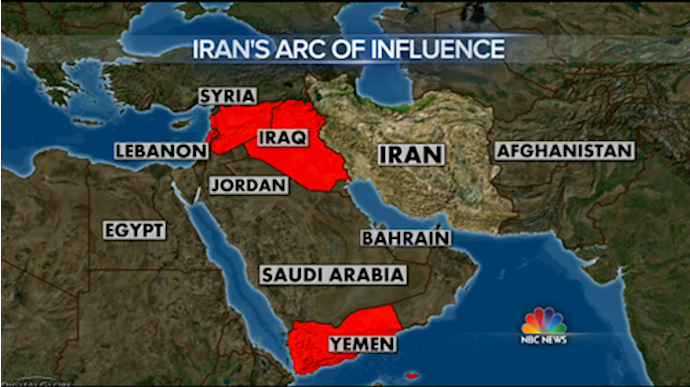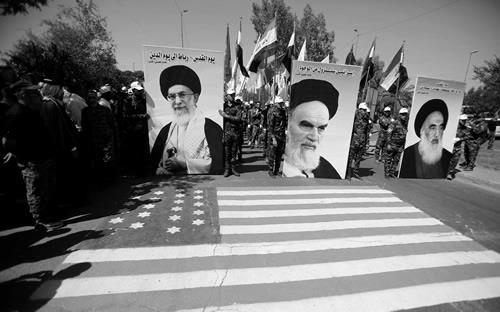By Heshmat Alavi
Al Arabiya, 17 July 2017 – With the recapturing of Mosul, the rein of ISIS in northern Iraq is coming to an end. This, however, can lead to the reemergence of a far more dangerous threat for the future of this fledgling democracy.
Iran and its destructive meddling Mesopotamia has devastated this entire nation, leaving at least tens of thousands killed, scores more wounded, injured and displaced.
Tehran has continuously targeted the Sunni community in Iraq and taken advantage of the war against ISIS to change the very fabric of this minority. Sunni provinces have been the target of this wrath especially after Nouri al-Maliki, described by many as Iran’s puppet in Iraq, reached the premiership in 2006.
Dark history
Ever since 2003, with a surge beginning under al-Maliki’s watch, Iran has flooded its western border neighbor with financial, logistical and manpower resources, spearheaded by the Revolutionary Guards (IRGC).
The track record of Iran-backed proxy groups and death squads in Iraq is nothing short of deadly and atrocious. One group alone, Asai’b Ahl al-Haq, claims to have launched over 6,000 attacks targeting US soldiers from 2006 onward.
Amnesty International has also filed a disturbing report over Iran-backed militias being supplied US arms by the Iraqi government, only to carry out war crimes targeting the Sunni community.
War against ISIS
The defeat of ISIS must not be considered the end of the nightmare. Far from it. General Stephen Townsend, commander of the coalition forces against ISIS, recently emphasized the importance of all Iraqi parties reaching a political consensus in the post-ISIS stage.
To emphasize his point, Townsend touched on the sensitive topic of Iraqi Sunnis feeling unrepresented in Baghdad.
Former US defense secretary Ashton Carter, who supervised the anti-ISIS effort from early 2015 to January of this year, underscored “chaos and extremism” will follow if the “political and economic campaigns that must follow” fail to render the results needed for Iraq future’s.
The hidden occupation
On a side-note, the internal sectarian drives in Iraq are not be considered the result of an especially bloody history. Iraq’s conglomerate of communities experienced peaceful coexistence for over a millennium.
As Iran began its hidden occupation from 2003 onward, one campaign pillar focused on instigating sectarian strife with the objective of expanding its influence through Shiite communities in strategic areas across the country. Such policies have been carried out vividly in all Sunni provinces recaptured from ISIS control.
There is no need to divide Iraq into federalized states, as this would deepen the rifts amongst a nation that needs to begin rebuilding the bridges and bonds destroyed.
Members of Popular Mobilization hold portraits of Ayatollah Khomeini (C), Supreme Leader Ayatollah Ali Khamenei (L) and Iraq’s top Shi’ite cleric Grand Ayatollah Ali al-Sistani during a parade marking the annual al-Quds Day in Baghdad on June 23, 2017.
Independent figure
Despite all the flaws in the campaign against ISIS, Prime Minister Haider al-Abadi has the potential to be pulled out of Iran’s influence and act as an independent figure. This is especially true as he has stood in the face of Iran’s pressures, while there remains far more necessary cleansing of the mullahs’ influence in Iraq.
Following the historic Riyadh summit earlier this year, it is time for the Trump administration, allied with the Arab World, to take serious action curbing Iran’s influence in Iraq.
All al-Abadi government officials must prove their allegiance to the Iraqi people and not the Iranian regime. The Iraqi judiciary is also heavily under Tehran’s influence, seen specifically when the country’s supreme court last October blocking al-Abadi’s reform package aiming to “decrease the political space — and platform — for sectarian saboteurs and political spoilers like Maliki,” as explained in The Hill.
Steps ahead
Iraq now lays in devastation and the road ahead will be difficult. This country needs the correct support from its well-meaning neighbors – not the regime in Iran – and the international community to once again stand on its own and play its expected part in today’s world.
This is a breakdown of the utmost necessary measures:
1) Stanching Iran’s influence, especially at senior levels in Baghdad and the security apparatus, and supporting al-Abadi distance from Iran
2) Confront Iran’s meddling by preventing al-Maliki from regaining the premier seat, and dismantling the Popular Mobilization Units and all death squads, parallel to blacklisting Iran’s IRGC
3) Supporting the Sunni community in all Iraqi hierarchy and security forces, and establishing an equal method of governance across the country.
In a recent speech, Iranian opposition leader Maryam Rajavi highlighted how Iran has for 38 years been at war with Iraq and other nations in the region and beyond.
She underscored, “…the ultimate solution to the crisis in the region and to confronting groups like ISIS lies in the overthrow of the Iranian regime by the Iranian people and it’s Resistance.” That seems to be the only way to protect Iraq from Iran.









